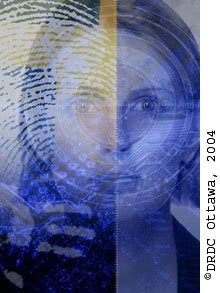 CLARKSBURG, W. Va.-The FBI is embarking on a $1 billion effort to build the world's largest computer database of peoples' physical characteristics, a project that would give the government unprecedented abilities to identify individuals in the United States and abroad.Digital images of faces, fingerprints and palm patterns are already flowing into FBI systems in a climate-controlled, secure basement here. Next month, the FBI intends to award a 10-year contract that would significantly expand the amount and kinds of biometric information it receives. And in the coming years, law enforcement authorities around the world will be able to rely on iris patterns, face-shape data, scars and perhaps even the unique ways people walk and talk, to solve crimes and identify criminals and terrorists. The FBI will also retain, upon request by employers, the fingerprints of employees who have undergone criminal background checks so the employers can be notified if employees have brushes with the law."Bigger. Faster. Better. That's the bottom line," said Thomas E. Bush III, assistant director of the FBI's Criminal Justice Information Services Division, which operates the database from its headquarters in the Appalachian foothills.The increasing use of biometrics for identification is raising questions about the ability of Americans to avoid unwanted scrutiny. It is drawing criticism from those who worry that people's bodies will become de facto national identification cards. Critics say that such government initiatives should not proceed without proof that the technology really can pick a criminal out of a crowd.The use of biometric data is increasing throughout the government. For the past two years, the Defense Department has been storing in a database images of fingerprints, irises and faces of more than 1.5 million Iraqi and Afghan detainees, Iraqi citizens and foreigners who need access to U.S. military bases. The Pentagon also collects DNA samples from some Iraqi detainees, which are stored separately.The Department of Homeland Security has been using iris scans at some airports to verify the identity of travelers who have passed background checks and who want to move through lines quickly. The department is also looking to apply iris- and face-recognition techniques to other programs. The DHS already has a database of millions of sets of fingerprints, which includes records collected from U.S. and foreign travelers stopped at borders for criminal violations, from U.S. citizens adopting children overseas, and from visa applicants abroad. There could be multiple records of one person's prints."It's going to be an essential component of tracking," said Barry Steinhardt, director of the Technology and Liberty Project of the American Civil Liberties Union....
CLARKSBURG, W. Va.-The FBI is embarking on a $1 billion effort to build the world's largest computer database of peoples' physical characteristics, a project that would give the government unprecedented abilities to identify individuals in the United States and abroad.Digital images of faces, fingerprints and palm patterns are already flowing into FBI systems in a climate-controlled, secure basement here. Next month, the FBI intends to award a 10-year contract that would significantly expand the amount and kinds of biometric information it receives. And in the coming years, law enforcement authorities around the world will be able to rely on iris patterns, face-shape data, scars and perhaps even the unique ways people walk and talk, to solve crimes and identify criminals and terrorists. The FBI will also retain, upon request by employers, the fingerprints of employees who have undergone criminal background checks so the employers can be notified if employees have brushes with the law."Bigger. Faster. Better. That's the bottom line," said Thomas E. Bush III, assistant director of the FBI's Criminal Justice Information Services Division, which operates the database from its headquarters in the Appalachian foothills.The increasing use of biometrics for identification is raising questions about the ability of Americans to avoid unwanted scrutiny. It is drawing criticism from those who worry that people's bodies will become de facto national identification cards. Critics say that such government initiatives should not proceed without proof that the technology really can pick a criminal out of a crowd.The use of biometric data is increasing throughout the government. For the past two years, the Defense Department has been storing in a database images of fingerprints, irises and faces of more than 1.5 million Iraqi and Afghan detainees, Iraqi citizens and foreigners who need access to U.S. military bases. The Pentagon also collects DNA samples from some Iraqi detainees, which are stored separately.The Department of Homeland Security has been using iris scans at some airports to verify the identity of travelers who have passed background checks and who want to move through lines quickly. The department is also looking to apply iris- and face-recognition techniques to other programs. The DHS already has a database of millions of sets of fingerprints, which includes records collected from U.S. and foreign travelers stopped at borders for criminal violations, from U.S. citizens adopting children overseas, and from visa applicants abroad. There could be multiple records of one person's prints."It's going to be an essential component of tracking," said Barry Steinhardt, director of the Technology and Liberty Project of the American Civil Liberties Union....To read more go to:
http://www.washingtonpost.com/wp-dyn/content/article/2007/12/21/AR2007122102544_pf.html
As in the days of Noah....






















































































.bmp)

























.bmp)